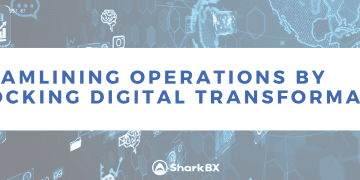Written by: Chafic Kharma – SharkBX
In light of Saudi Arabia’s Vision 2030, businesses are increasingly recognizing the critical need for digital transformation to enhance competitiveness and operational efficiency. This transformative vision aims to diversify the economy and foster sustainable growth through modernization across public and private sectors. As technology rapidly evolves, organizations must evaluate their operating models to determine if they are equipped to thrive in the digital age. Traditional operating models often struggle with operational inefficiencies and missed opportunities, necessitating a shift toward more innovative, technology-driven structures.
Digital transformation is essential for businesses looking to align with Vision 2030 objectives. A notable example is Saudi Aramco, which has effectively utilized advanced data analytics and artificial intelligence (AI) to optimize extraction processes and implement predictive maintenance, leading to significant reductions in downtime. This showcases the potential for digital innovations to reshape business practices and enhance agility. Key differences between traditional and digital operating models highlight the necessity for change. Traditional models are hierarchical and siloed, while digital models emphasize a flat and integrated approach. Traditional processes are often manual and slow, in contrast to the automated and rapid operations seen in digital frameworks. Furthermore, traditional decision-making relies on intuition, whereas data-driven, analytical approaches characterize digital models.
To remain competitive, organizations must adopt digital operating models that promote cross-functional collaboration. Essential components include digital technologies to automate processes, data-driven insights for proactive decision-making, and agile processes that foster continuous improvement. An innovative culture is vital for attracting top talent and ensuring success. Saudi Arabia’s success stories, such as the Saudi Telecom Company (STC) and the NEOM Project, exemplify the effective integration of technology in transforming operations. STC has improved efficiency and customer experiences through big data, IoT, and cloud computing, while NEOM sets a global benchmark for smart cities by employing AI, IoT, and robotics.
Despite these advancements, companies face challenges in adopting digital operating models, including legacy systems that hinder integration, resistance to change, and the need to ensure data privacy and security. The recent AI summit in Riyadh emphasized the role of AI in transforming industries, underscoring the importance of aligning operating models with these technological advancements.
SharkBX specializes in assisting organizations in redefining their operating models to fully embrace digital transformation. From strategic development to implementation, SharkBX guides businesses through the complexities of transitioning to agile, data-driven processes. Companies interested in bridging the gap in their digital transformation journey are encouraged to connect with SharkBX to explore potential pathways for success.
About SharkBX
SharkBX is a leading consultancy specializing in digital transformation and operational efficiency. With a focus on guiding businesses through their evolution, SharkBX empowers organizations to adopt innovative technologies and improve performance in an ever-changing marketplace.
Contact Information:
Chafic Kharma
Managing Partner – SharkBX
Email: Info@sharkbx.com
Phone: +966 534404358
Get the latest supply chain report news at The Supply Chain Report. Learn more about international trade with tools from ADAMftd.com.
#DigitalTransformation #SaudiVision2030 #OperationalEfficiency #AIinBusiness #InnovativeOperatingModels















